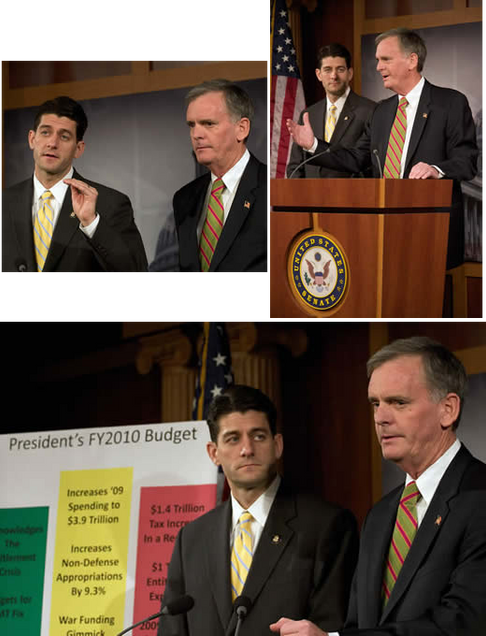New Hampshire Delegation Reacts to Obama’s Budget
BudgetNH
New Hampshire Union Leader
Aoife Connors and Jillian Jorgensen
Boston University Washington News Service
Feb. 26, 2009
WASHINGTON – New Hampshire lawmakers divided sharply Thursday over President Barack Obama’s budget proposals for next year and for the long term.
Sen. Judd Gregg, R-N.H, the top Republican on the Senate Budget Committee, led the Republican assault on the budget at a press conference with Rep. Paul Ryan, R-Wis., the senior Republican on the House Budget Committee.
“I have some severe reservations about where this budget is taking us, and the issue really comes down to this: where’s the restraint in spending?” Gregg asked.
“This budget doubles the debt of the federal government in five years, triples the debt of the federal government in 10 years, builds up obviously massive deficits over this period, and never really gets us back to a point where we’re on a glide path toward getting control over the costs that we’re passing on to the next generation,” he said.
Sen. Jeanne Shaheen, D-N.H., on the other hand, praised Obama’s announced goal of cutting in half the $1.75 trillion deficit by 2013. “I think we’ve got to work very hard to address the debt and the deficit,” she said, because “it’s not in the country’s interest to continue to carry the kind of debt and deficits that we’ve inherited from the last administration.”
“I think it’s positive that the president has made a commitment to try and reduce the deficit in half by 2013,” Shaheen said.
But Gregg slammed Obama’s promise to cut the deficit in half, saying a $500 billion deficit would still be left. If the budget kept to the current spending baseline, he said, the deficit would drop to about $150 billion in the same time.
“It’s like you take four steps back and then only take two steps forward,” he said. “We’re taking four steps back in the deficit fight and then we’re only taking two steps forward in the deficit fight, when if you were just to stay on the basic course you’re on, you could take three steps forward.”
Gregg expressed concern that tax increases would put a heavy burden on small-business owners.
But Shaheen, who visited 30 New Hampshire small businesses last week, said: “I’m not sure what context Sen. Gregg was talking about taxing small businesses. I certainly am going to work to address their tax rates and do everything I can to make sure small businesses get the support they need.”
While Republicans slammed Obama for proposing to raise taxes in a recession, U.S. Rep. Carol Shea-Porter, D-N.H., said middle-class families would not see a tax hike.
“He’s keeping a commitment and a promise for the middle class; there is no tax increase for them,” she said. “This country needs revenue. I think it’s perfectly fair to expect those who earn the most to pay their fair share. There is no tax increase for about 95 percent of this country.”
She added,. “No matter what people in Washington say– Republican leaders in Washington– President Obama went around this country, spoke to millions of Americans, spoke about his plans that are reflected in this budget, and Americans said ‘yes’ and voted for him.”
Gregg said the budget was a missed opportunity to make Social Security fiscally solvent for the next 50 years and achieve Medicare reform.
“If we did those two things jointly in a bipartisan way, we would create a massive amount of confidence in the American people,” he said.
“I would have liked to see a pathway to get Social Security reform along the lines of Conrad-Gregg,” a plan he and Senate Budget Committee chairman Kent Conrad, D-N.D., have developed calling for a commission to study entitlement spending, Gregg said after the news conference.
Gregg said he saw promise in the budget’s plan to apply income standards for premium payments to the Medicare drug subsidy program and its proposal to cut subsidies for some large farms.
The president’s proposed “down payment” on health care reform is described in the budget as costing $634 billion, but Gregg estimated that it would truly cost more than $1 trillion.
But Shaheen insisted that “we’ve got to address our health care system if we’re going to get this economy going right again in the long term.”
While Americans pay more for health care than do citizens of most industrialized nations, Shaheen said, “we’re getting poorer outcomes on many things,” a sentiment Gregg also expressed.
Gregg said it was possible to reform health care without additional costs.
“When you’re spending 17.5 percent of GDP [gross domestic product] on health care … you’ve got a lot of money in the system, and that money should just be allocated in a more efficient way,” he said.
Rep. Paul Hodes, D-N.H, said in a statement that he looked forward to working with the president and other members of Congress to make “critical decisions to create more jobs; reinvest in health care, alternative energy and education; and work to cut the deficit.”
The budget requires scrutiny, Hodes said, “to make sure we are not spending billions on wasteful government programs that won’t create jobs, rebuild our economy and improve America’s stature throughout the globe.”
As for where the budget that Republicans plan to introduce would get its money, Gregg cited entitlement cuts.
“Let me quote a sage, [bank robber] Willie Sutton: you go where the money is,” Gregg said. “The money is in entitlements. Almost all the cost of the growth of the federal government is driven by entitlement spending.”
###


